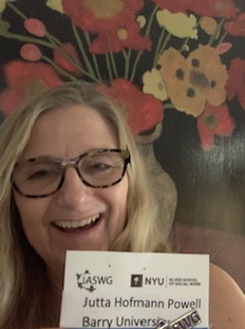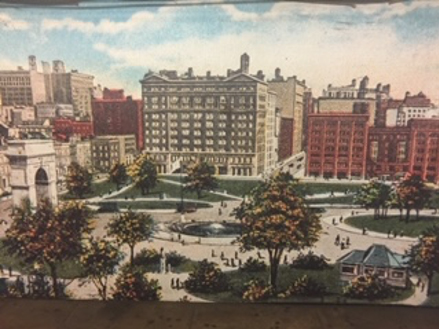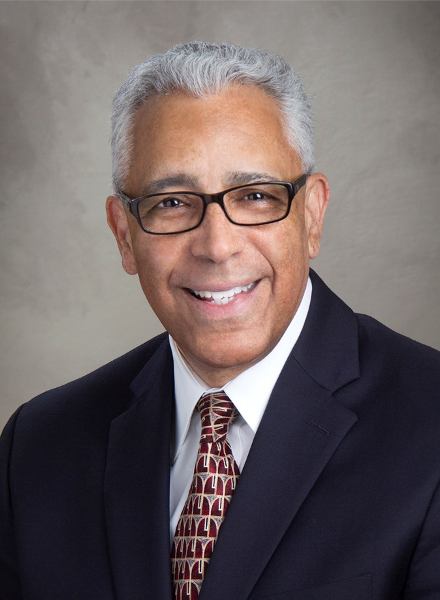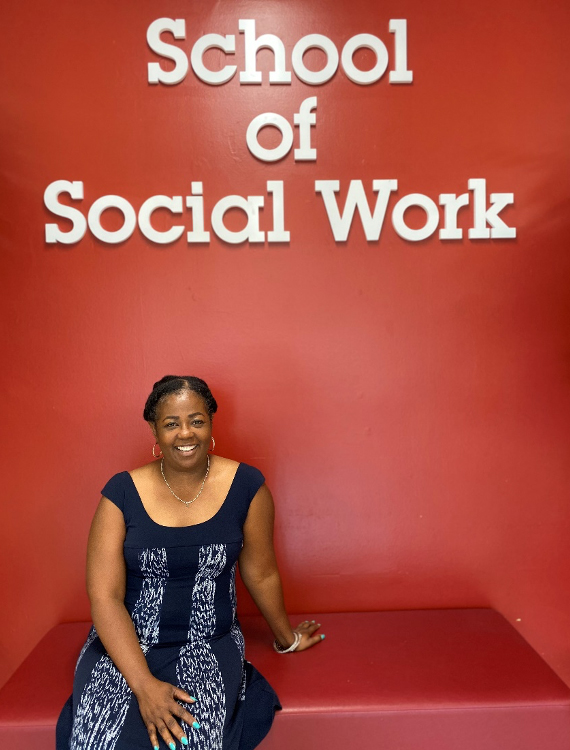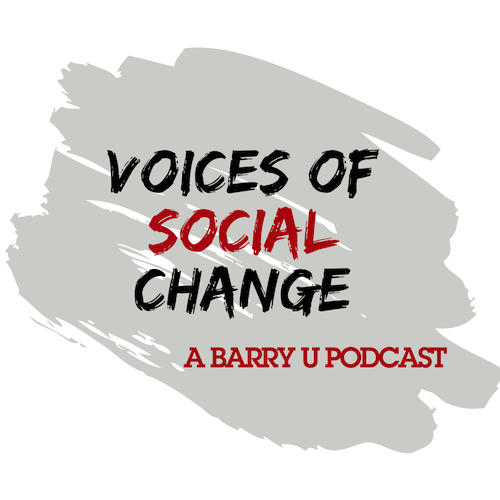|
|
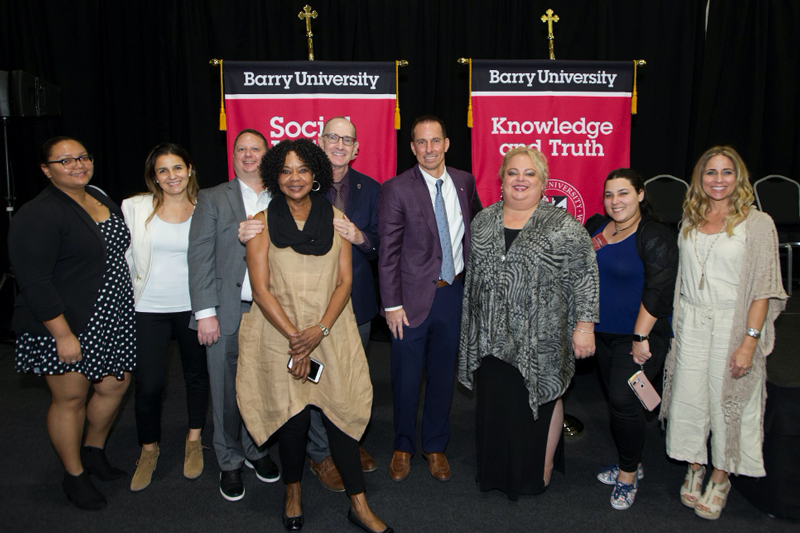
|
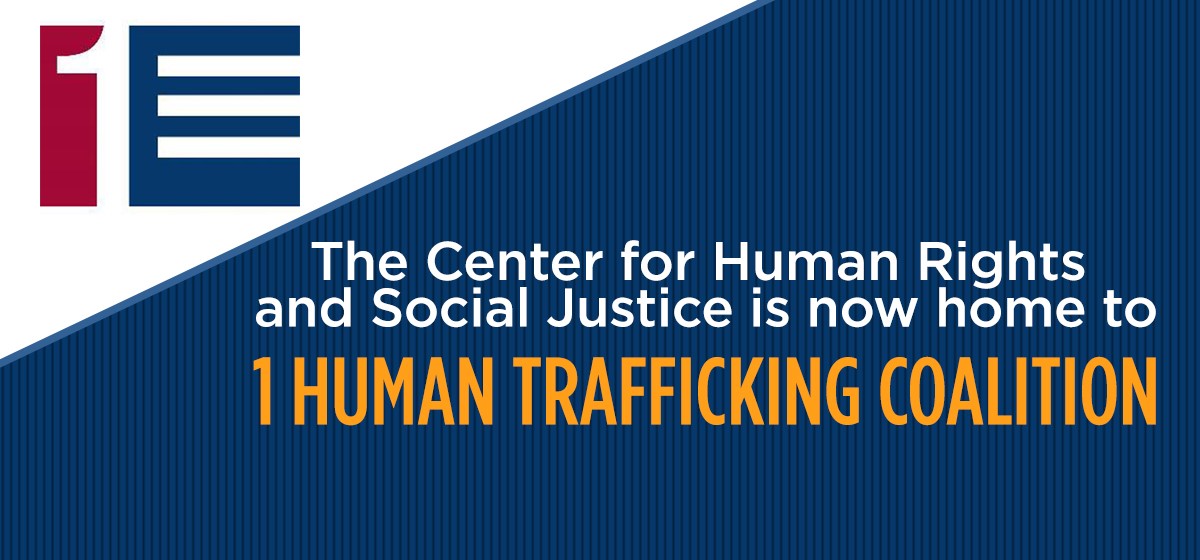
|
| PACE Center for Girls Pilot Research (research with CHRSJ students and Dr. Sheila McMahon) |
|
This exploratory study aims to understand the social and emotional learning needs of a group of middle-school girls through a trauma-informed, community-based, participatory-action research project. Using concept mapping, the girls in the class will be invited to identify challenges to their full participation as learners and members of their school community. Based on the identified needs, restorative practices (such as art, mindfulness, and non-violent communication strategies) will be incorporated into weekly classes to address these needs and concerns. Participants will re-evaluate their concerns at the conclusion of the course. |
| Prejudice Reduction and Diversity Training at Barry University |
|
For the second year, The CHRSJ Program Coordinator, Carolina Rios, and Resident Assistant Director, Judisha Williams, facilitated a half-day workshop for more than 30 new and returning Resident Assistants on their orientation week. Through a series of exercises based on the tenants of the intergroup dialogue (IGD) model, students were able to engage in peaceable, focused, and organized dialogues about different social justice topics such as gender, sexual orientation, race, and religion. The workshop was an introduction to other dialogue programs carried out by the CHRSJ, and was intended to facilitate self-identity exploration, recognition of prejudices and biases, and to create relationship-building through open communication and dialogue. Carolina Rios said, “We know that one of the main issues with diversity and inclusion programs is the lack of understanding and exploration of our own biases. In fact, more than 80% of the student leaders interviewed before this workshop responded that they do not consider themselves prejudiced or stereotypical. We still have more work to do in terms of bias awareness and self-identity exploration within our campus; both within staff, faculty and the student body. But these types of collaborations make systematic campus-culture change possible.” In fact, in recent years, The Center for Human Rights and Social Justice and the Division of Administrative Services and Organizational Development have done tremendous work in expanding the already established TRACKS program and making these types of dialogues available for faculty and staff, as well as students. The TRACKS Program at Barry University is a shorter version of the IGD Michigan Model from the University of Michigan National Intergroup Dialogue Institute, and has been in existence at Barry University for more than five years. This year, under the guidance of Dr. Mitch Rosenwald, the team is conducting research on race relations on our campus by bringing together people from different social identity groups in a sustained, facilitated and comfortable environment. If you are interested in participating in the study, or have questions about this program please contact: Carolina Rios, M.A- CHRSJ Coordinator: crios@barry.edu |
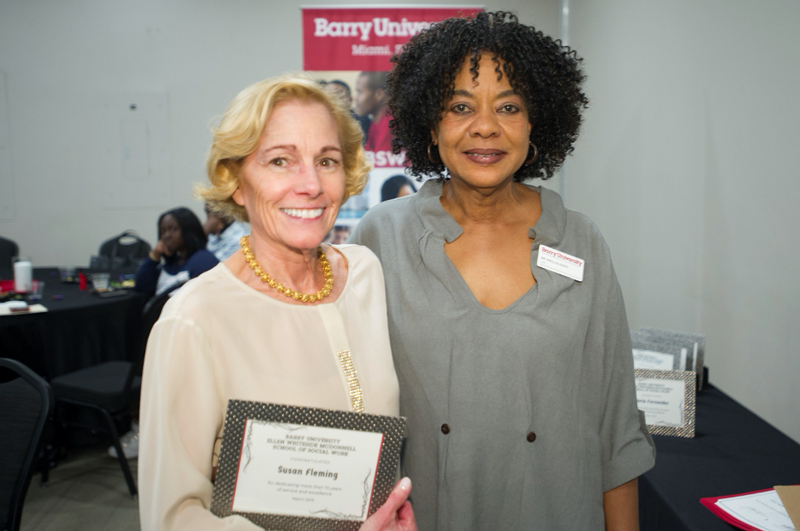
|
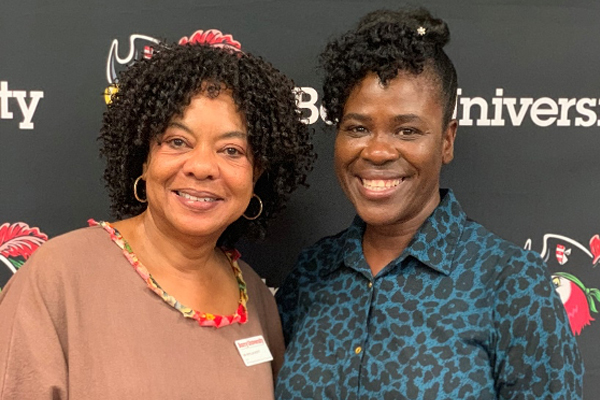
|
| Student Highlight: Angela Freemont |
|
In collaboration with Barry University’s relief effort, the School of Social Work appointed Social Work Student Ambassadors to assist in collecting donations for the Hurricane Dorian Bahamas Disaster Relief. We would like to acknowledge MSW student Angela Freemont, who went above and beyond her line of duty, showed great leadership, and was able to make an exceptionally generous contribution to this endeavor. Angela said, “I felt that it was necessary to get involved because we are our brothers’ keeper. It is always a pleasure for me to help, and it comes naturally; I serve with pride. I was overjoyed when my school got involved in the relief drive—this makes it easier for me because I know that it is a reputable institution.” |
| Professional Development: Facilitated by Shirley Roseman |
|
“Trauma and the Trans Experience" was a primer for Barry Social Work students on issues that transgender people face in the United States. Social workers are increasingly likely to work with a trans person within their career, yet few are equipped with even rudimentary knowledge of the community. Students learned briefly about the staggering rates of trauma, rejection, and violence trans people experience. Students then watched segments of the documentary Trans: the Movie, in which trans people shared their firsthand experiences. Social workers often support those most marginalized by society, thus, it is imperative that social-work students be educated whenever possible on matters that affect as many groups as possible, including the trans community.” Shirley Roseman is a cisgender queer woman and proud MSW graduate currently working as a youth therapist for Sunserve. |
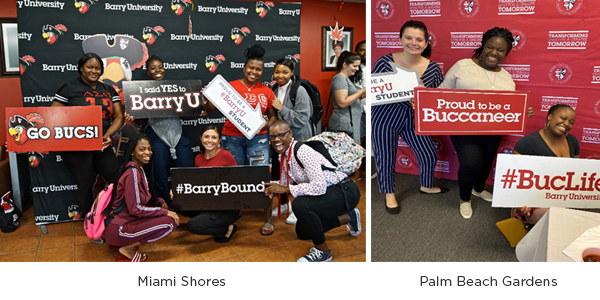
|
| SSW Fall Bash – Miami & Palm Beach Gardens |
|
On September 17th and November 23rd the School of Social Work celebrated their annual Fall Bash in both Miami Shores and Palm Beach Gardens. Current students, alumni, and future students were in attendance alongside faculty, staff, and administration. “The fall bash was a great opportunity for all of the morning, evening, and even students from other sites to come together, network, and talk about social work and our classes in a casual environment,” one student said. During the Miami Shores event, the Student Social Work Association candidates gave their campaign speeches to the audience. Attendees also took golf cart tours of the campus, socialized with administrators, and gathered with alumni and prospective students. In Palm Beach Gardens, students joined together, had lunch, participated in the Bahamas relief toy drive and mingled with faculty and staff. |
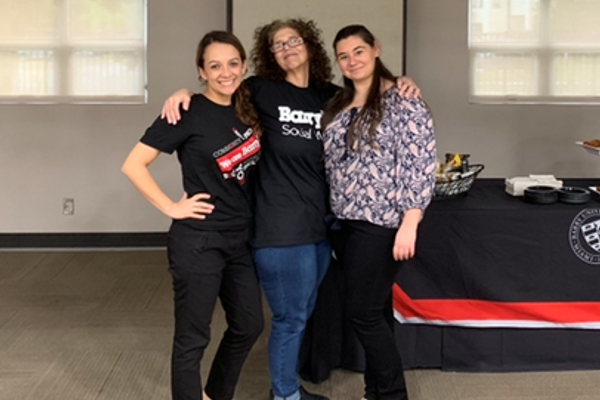
|
| Accessing Internal Resources through Expressive Arts |
|
This fall, the Center for Human Rights and Social Justice, the School of Social Work, and the Office of Accessibility services launched an expressive arts initiative focusing on self-care and community, open to all Barry University students. I had the pleasure of working with Dr. Heidi Heft LaPorte, Associate Professor at Barry University’s School of Social Work, Lina Villegas, Director of the Office of Accessibility, and Carolina Rios, Coordinator of the Center for Human Rights and Social Justice, to develop a bi-weekly program called Accessing Internal Resources through Expressive Arts. Held on alternating Friday evenings from 6:00 pm to 8:00 pm, the program provides a space for students to create art journals that serve as portable self-reflection containers. Throughout the semester, students bring their journals and other art projects to work on using a variety of mediums such as watercolors, acrylic paint, fabrics, pastels, and more. The goal of the program is to provide a venue for students to cultivate coping strategies and build a personal practice embracing mindful self-compassion. Students share strengths and create a caring community grounded in respect for self and others. A research study is being planned while the pilot is ongoing. According to Dr. LaPorte, each individual has the capacity for creativity. The emphasis is on self-reflection, followed by meaningful engagement in a brave and safe space. On a personal note, Dr. LaPorte has fostered these same values in me, and consistently supports her students in finding creative outlets for self-expression. Her compassion for and dedication to her students is unparalleled. I learned about this opportunity while having a conversation with Dr. LaPorte, my academic advisor, about how to integrate my passion for music with my love for social work. She shared her idea and invited me to be a graduate assistant, and to bring my own love of art and music to this process. As a student also registered with the Office for Accessibility Services, I jumped at the chance to be a part of this incredible opportunity. I am honored to share the values of expressive arts with my peers. Expressing myself creatively has always been my passion and has provided a safe place to explore my fuller self and embrace who I am. Through my involvement, I hope to share with others with the chance to explore their creative potential and the possibilities of what expressive arts can do for them moving distress to de-stress! — Sara Nusbaum, MSW student, Barry University School of Social Work. |
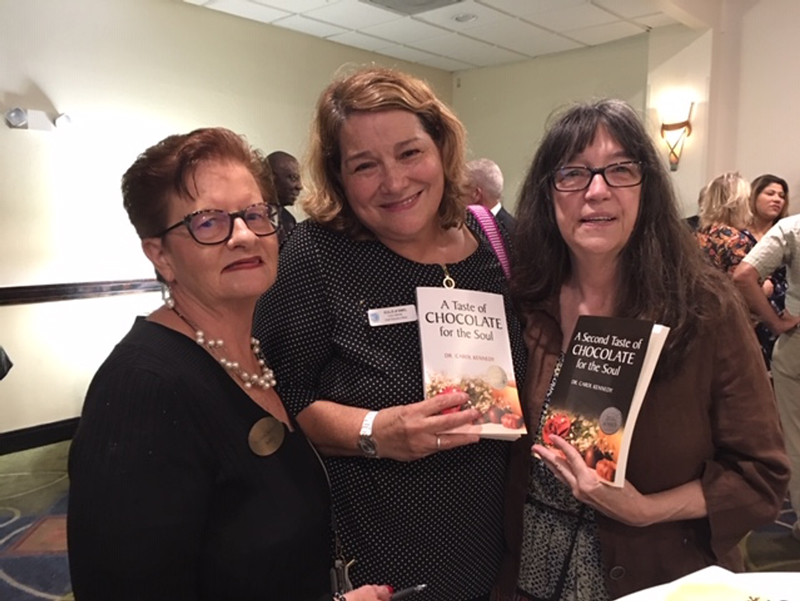
|
| Alumni Spotlight: Lucy Garcia, MSW, RSWI |
|
The Organization Intl de Latinos en el Exterior, an organization founded by Barry University School of Social Work alum Lucy Garcia, MSW, RSWI, was nominated for the 2019 ENPY Rising Organization of the Year award. The ENPYs showcase excellence in nonprofit performance by recognizing the very best nonprofit organizations, executives, board members, staff, volunteers, and business partners. When asked about the nomination Ms. Garcia said, “I can tell you that I live every single day as it is my last one. Today I am not practicing what I will do tomorrow, today is the real thing! I came to this country as undocumented, and always embrace every single opportunity that came my way. Don’t be afraid to be the voice of the voiceless, and speak up for the underserved! I hope this will give you an idea of who I am. I am BARRY proud to be a BARRY graduate! I have a great team that I work with and alongside Betsy, we were able to make this happen.” |
| Faculty Highlight: Dr. Michael Alicea | ||||
|
| Staff Highlight | ||||
What has surprised you most about working in the field of social work? Diversity that it has offered and all of the things I can do with my degree. What's the best/worst thing to happen since you started working in social work? Worst: the degree is a hidden treasure and people outside of the field of social work do not understand the role of Social Workers in the 21st Century. Best: Discovering all of the different ways that the SW degree can be applied. I never get bored! What do you wish other people knew about social work? It’s more than just case management and its more than just therapy. It can be a tool to empower individuals and communities. It is a tool for advocacy, justice and change. What would you say are some of your strongest beliefs about social work? I am an advocate of the theory of resiliency and my strongest belief is that people’s capacities are usually underestimated. People possess tremendous abilities to adapt change, and grow. The Theory of Resiliency postulates that one person can make a difference. I believe that to be true. Tell me about someone who has influenced your decision to work at Barry University School of Social Work? Dr. Walter Pierce. He was one of my first instructors and, in my opinion, he embodies social work and especially social justice. He sparked a fire in me for social change. That’s when I decided that social work was a perfect fit for me. He sparked a desire in me to work with communities and groups of people for engagement and change. The other person is Dr. Sarah Ingram-Herring. she’s a longtime colleague and I saw how happy she appears to be working here at Barry. What might someone be surprised to know about you? I have recently, over the last year or so, started amateur acting. I will be in my second production November 2nd at Coral Springs Center for the Arts. I also recently established a non-profit corporation: Riviera Beach Cares: Homeless Coalition for Families. I recognized a huge gap in services for families who find themselves in a homeless crisis—that is, there are no emergency shelters in Palm Beach County where homeless families can go and have a safe, clean place for themselves within 24 hours of their homeless crisis. I brought together community stakeholders and developed a triage process that meets the families’ immediate need for shelter, and then navigates them through the process of identifying longer-term placement and additional support services. What would you tell someone who is thinking about entering the social work profession? Get ready for the ride of your life. Every case is different, every day is different and there’s always something new to learn academically, and from every single client and case. I feel blessed that I get to serve my community as a Social If you weren't our new Palm Beach program coordinator, what would you be doing instead, or what would your life be like? It’s crazy but, I am doing exactly what I want to do. I am very blessed and proud to be able to re-introduce my alma-mater to the Palm Beach County community. I enjoy the academic environment. I still have a small, clinical case load. I am still engaged in the community. I am still teaching, advocating and sharing information with the community. I believe that one reason oppression exists is because information often evades those who need it most. People are better enabled to help themselves with the right information and tools. How would someone describe you? They would definitely say I am a deep, creative thinker who loves to be productive. Funny and committed to faith and family. |
| Voices of Social Change Podcast | |
|
Did you know the School of Social Work has its own podcast? Check out the latest episode! |
|
|
| Upcoming Certificate Program Dates | ||||||||||||||||||||
|
|
Barry University School of Social Work 11300 NE 2nd Ave, Miami Shores, FL 33161 Phone Number: 305-899-3919 Email: ssw-admissions@barry.edu ©2020 Barry University. All Rights Reserved. |

